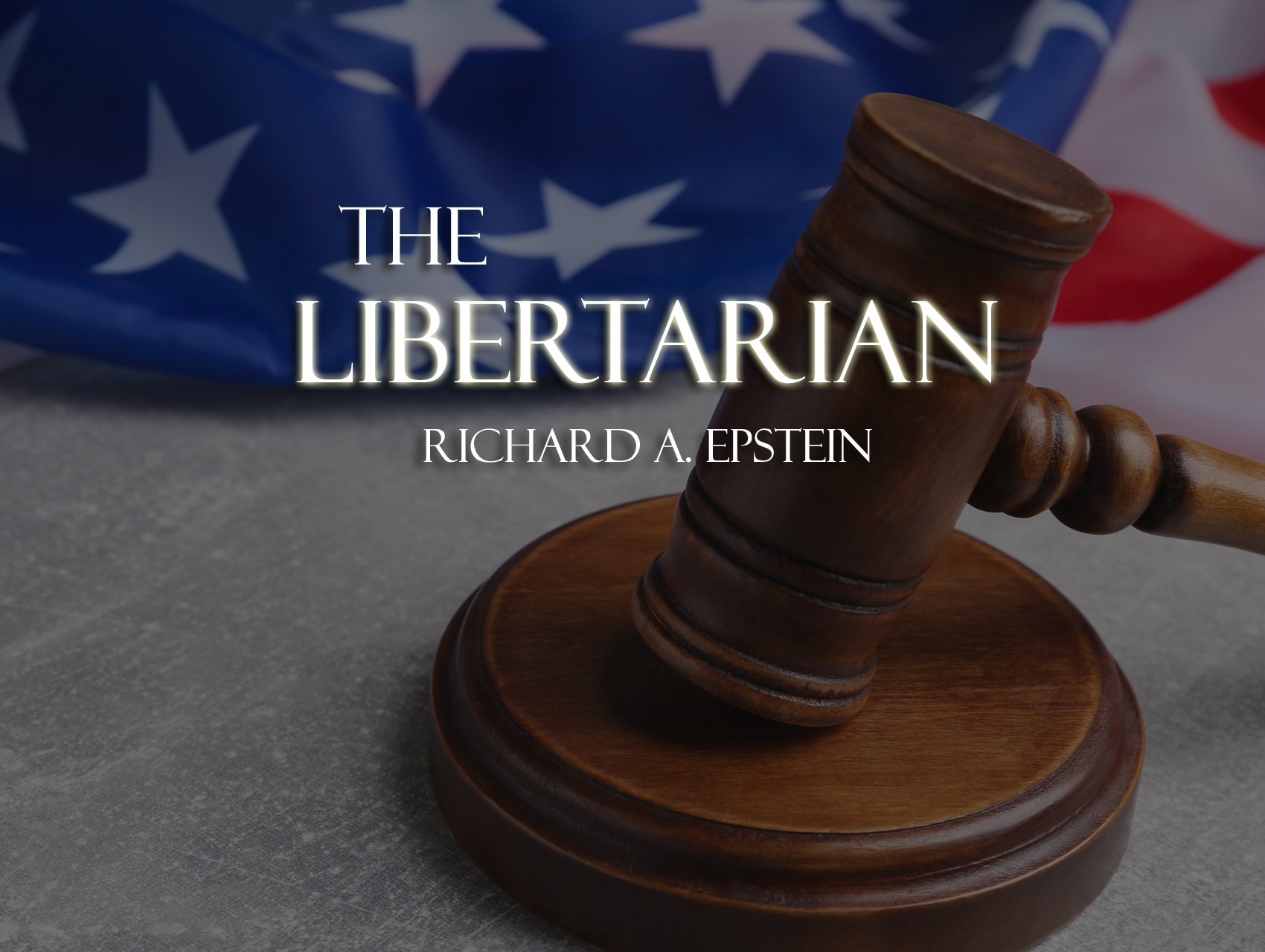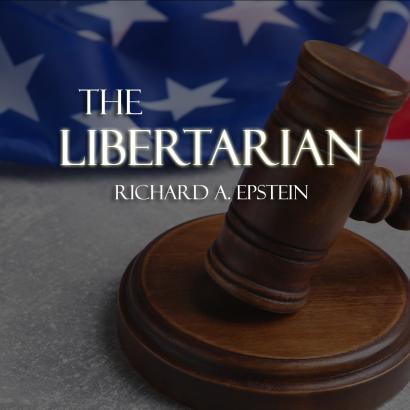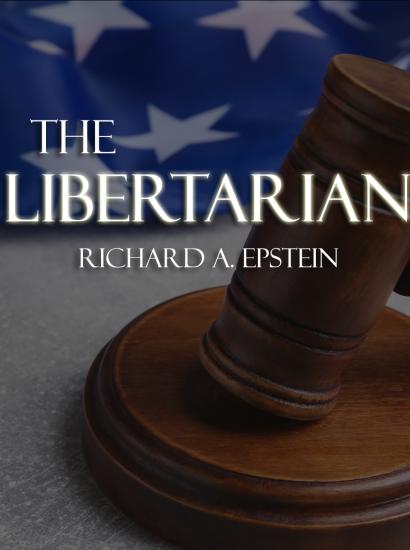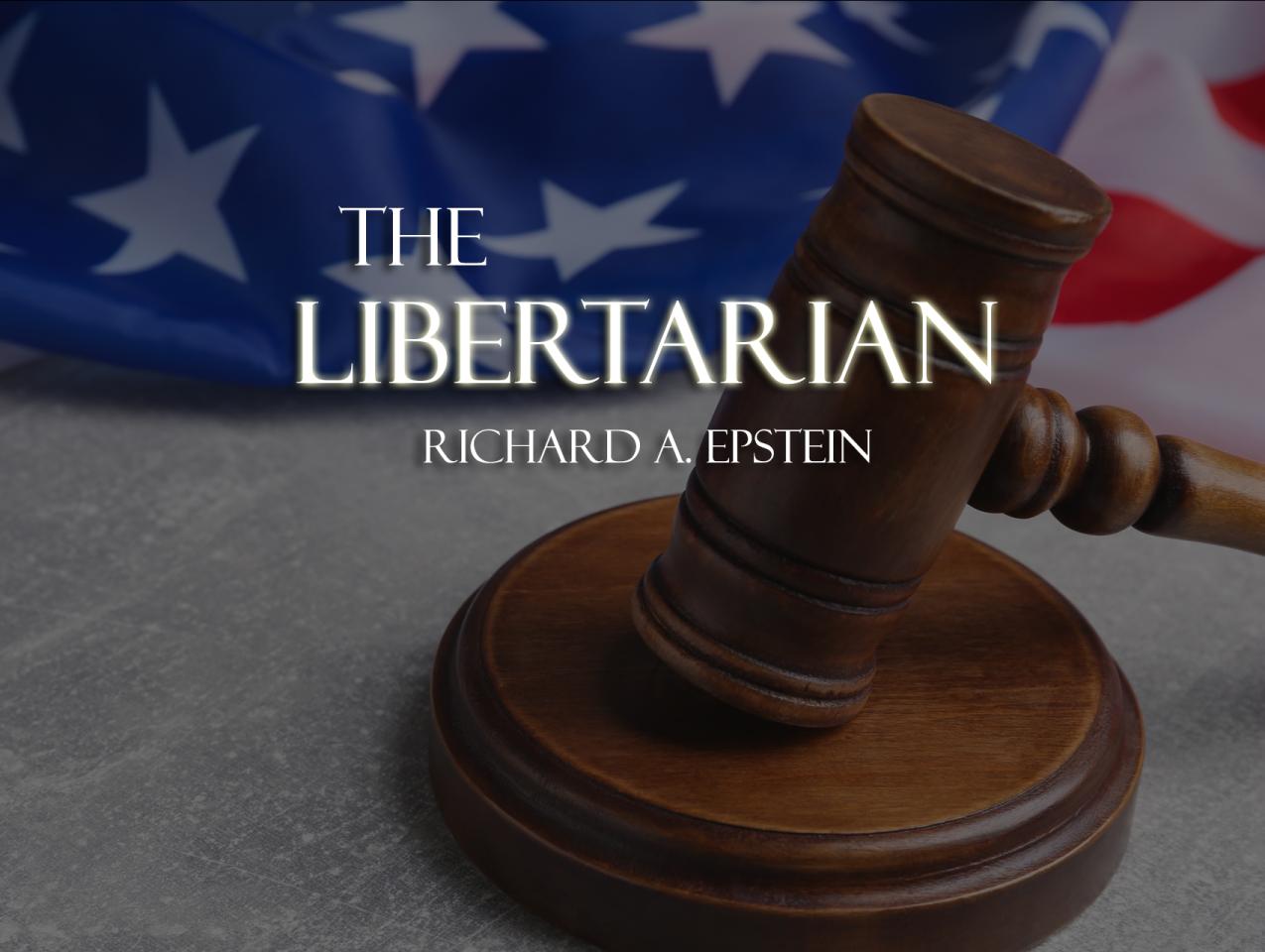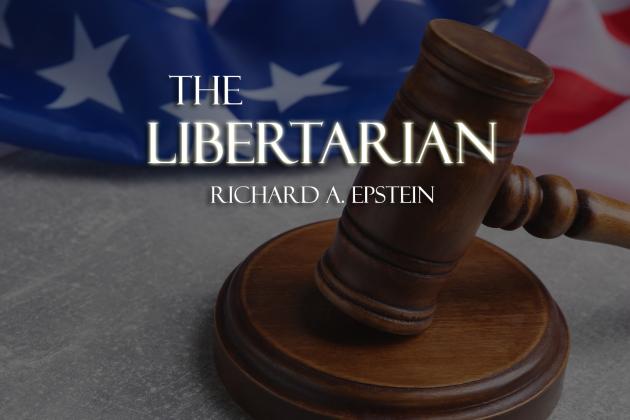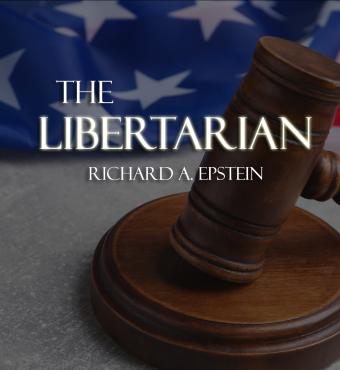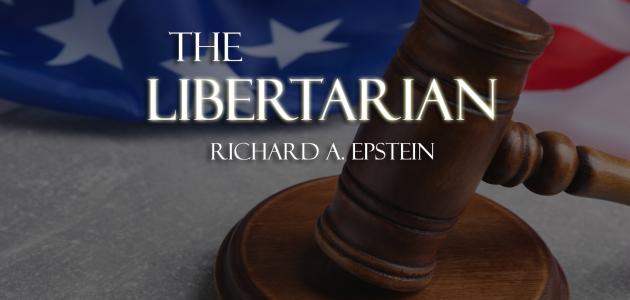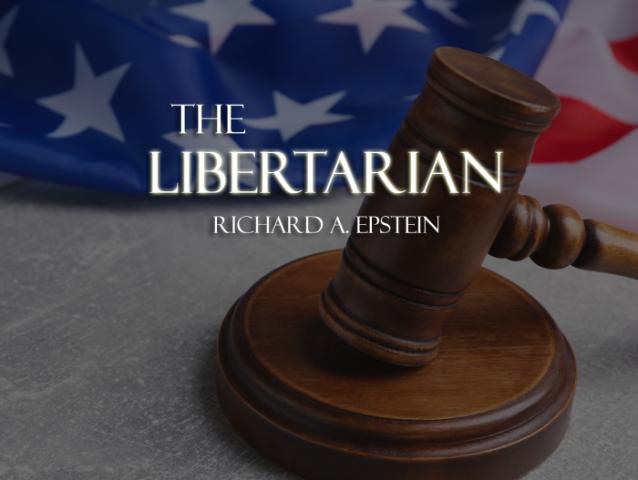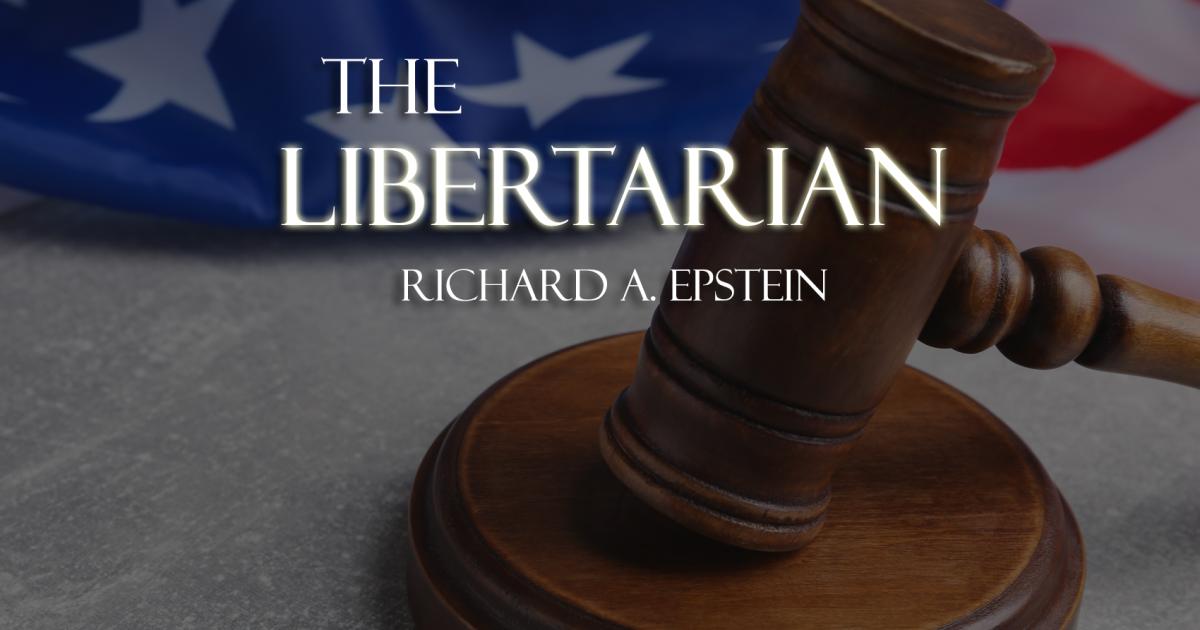- Politics, Institutions, and Public Opinion
Richard Epstein grades the contract demands of the Chicago Teachers Union, the severity of Trump’s alleged election interference, and efficacy of Biden’s new China tariffs.
_________________________
Transcript
Tom Church: [00:00:00] Welcome back to the Libertarian Podcast from the Hoover Institution. I'm your host, Tom Church, joined as always by the Libertarian, Professor Richard Epstein. Richard is the Peter and Kirsten Bedford Senior Fellow here at the Hoover Institution. He's the Lawrence A. Tisch Professor of Law at NYU and is a Senior Lecturer at the University of Chicago.
Richard, I know you just left Chicago, which is in the midst of a contract negotiation with the Chicago Teachers Union. Yes. It's pretty common around major cities, right? Uh, they sign these agreements every couple years with teachers unions, and it's, it's a big deal, because it is an enormous amount of money.
It's also where a bunch of rules are dictated for how these unions can run. I think, In normal life, periodic negotiations like this would depend on available competition, of which I don't think there is any, and maybe prior performance to [00:01:00] dictate how a future contract would go, but clearly that's not the case here.
So tell me how the negotiation is proceeding and what the city might not like about it.
Richard Epstein: Well, this is a disaster in the making. Uh, the first thing to note about this is it is not a negotiation between the city, the mayor, Brandon Johnson is a former head of the union, a big union aficionado, and the union, which is also pro union.
The real move is they know between them they can't possibly summon the resources to get the gigantic raises and other privileges that they want. So what they do is they march on Springfield, Illinois, which is equal. broke, saying that they're entitled to get their fair share of the wealth out of that situation, which means higher taxes on the downstate in order to transfer wealth to Chicago.
This is not going to be a winning play in terms of statewide election, and I think at this particular appoint the governor who's a hopeless man, the Pritzker fellow, Jay Pritzker, is essentially trying to straddle the [00:02:00] issue and to postpone the thing and sooner or later he's going to be forced to do it.
If they go on strike, I think it will be not a problem in the summer when there is no school, but come the fall, this thing is unresolved. It would be essentially, how does one describe it? A total catastrophe, given the utter dependence on the school system that so many lower income families have in the state.
Uh, most of the long It was a disaster
Tom Church: last time they did it though. Yes, but
Richard Epstein: but that was Lily life, but this guy makes her seem like a saint, even though she was anything but so he is completely feckless on this. He basically he can't even keep his food down. He's so tense and brought up about the whole thing.
So I've been told. And we have no idea what it's going to be. But essentially, they're putting everything on the plate. And the theory is, if you, the negotiation may be between zero and 10, but if you say my position is 100, what you'll do is say, well, I'll concede down to 15, right? I've given up most of what I've asked for, but most of the things that were asked for were [00:03:00] just, uh, excesses anyhow.
They want to have buses to deal with climate change, as if somehow or other that's the problem. Function of the school board, and they want to have all sorts of other benefits for people so as to allow them to live in comfort, whether or not they work at the school system. They want an enriched pension system and so forth.
They want 9 percent raises and so on. Um, and it's just the money is just not there. And there's so many other. Pressing demands inside of the city. And there is a mayor who is totally incompetent with respect to this and the governor who essentially turns a blind eye to any sensible proposal. So I think the basic situation is we don't know how this is going to come out, but we can figure out is They should never have been in this particular place to begin with.
As you know, I've been a determined foe of collective bargaining since I was a very young person in law school, even before then. And the explanation there is you never give the keys to the kingdom in the form of monopoly power, uh, to a union when there's no possible entry [00:04:00] by anybody else. So if you look at the private sector, unions generally now fail.
Not always. And they win occasional dramatic victories like they did with the UAW recently. Uh, but what happens is, uh, the employers who succumb to union brandishments turn out to find themselves having very heavy costs. They have to close down some of the plants or maybe shut down altogether. They try to move their locations out of hostile states into friendly states.
Uh, this creates all sorts of loss. So essentially many workers who watch unions fail in other places are very reluctant to sign on with them. Because they know in order to get the high wages, they have to take a far greater risk. They have to do union work. They have to go on strikes. They have to pay dues.
And so a lot of them just say, don't thank you. And union representation in the private sector is down to about 6%. I'm putting aside the social. In injustices of this system, the incredible externalities on other people when these services get shut down, it's just not in the [00:05:00] interest of the workers, which is why that number goes down in the United States and pretty much everywhere else, independent of the legal regime, because a union basically has, you know, 10 to 15 percent to your bill, when you put everything in and the question is, what are they giving you in exchange for the money they're exacting?
And it turns out most people come up with the conclusion, not very much given the insecurity that starts to take place. Now, the reason why public unions are at least somewhat different is, uh, there's no way you can shut down a school system and there's no new entry that could come in. Particularly if you're a very astute like the teachers unions are, and you fight to make sure that charter schools don't get a foothold in your area, or you try to make sure that homeschooling is looked upon with various kinds of disapprovals, and that you do take every possible step to make sure that there's no competitive.
Even there, they're losing some ground because the charter schools survive and the homeschooling expand. Uh, but the numbers on the private side are now around 33%. They were up [00:06:00] higher at one point, so they are losing some ground. But the difference is, it's just much harder to get rid of these guys because their monopoly position is much greater.
And then when it's backed by the state legislature, um, it turns out it can become well nigh insurmountable. So what's going to happen is we'll see whether or not they go a bridge too far. And so that the dislocations become so great and the pain on so many people so large that they're going to have to back down and fundamentally recalibrate the system.
And this is an election year and you know this is a big enough issue if it craters to actually turn this state to a fighting ground where Trump has a chance to win. One obvious point to note is the city of Chicago. It's about 1 3rd Hispanic, 1 3rd Black, 1 3rd White, mainly concentrated in the Northeast for the last group.
And the Hispanic vote has undergone a complete revolution since 2020. The Republicans have gained roughly 20 points on the Democrat, unheard of in [00:07:00] general politics, so they're now running even. And if that vote actually holds, polls, and then there's more antagonism in the white suburbs and so forth. It could be that the Democrats will be in for a competitive election.
They may well win, I would say the odds are still in their favor. But it's one thing to be in favor to have a lead. It's another thing to have an impregnable lead. And if you just have a lead, you've got to take resources you'd rather put elsewhere in competitive states, and now devote them here. And that may well be the case in Illinois, and it may well be the place in New Jersey.
But they have similar kinds of dislocation. And if you start looking at what the funding is about, what's happening is, I think Bill Barr said it best for most people, I will vote for the nominee of the Republican Party. I won't name him, but I'll vote for him. And the last news was that the Nikki Haley voters were breaking for Trump as well.
And the Wall Street money was turning in favor of Trump. But that's not just because of [00:08:00] this. It's because everything going on here. It's an echo of what Joe Biden has always said. I'm the most pro union president anywhere ever. He's made good on that promise to the detriment of large numbers of people would rather see the world organized in another fashion.
Tom Church: Richard, really quick follow up here. I mean, at some point you said you will see if the union goes too far. The city eventually might run out of money. I mean, we're getting to a point where, I don't know if it's one out of two dollars for the teacher's union goes to retirees, existing retirees, it's not even active services.
What would, what would Chicago's solution be to, all right, we've got a pension crisis, um, you know, what would that look like considering it's Completely democratic.
Richard Epstein: Well, this has always been a subject of extensive conversation and nobody knows how you put a municipal government into bankruptcy. So you'd have to fight that set of issues.
And in the interim, you would have to get some kind of interim government to make sure that the functions normally take over. Uh, but if you're talking about a sovereign, [00:09:00] uh, the usual solution, which is to put a board of trustees in place, uh, who represent the shareholders and the creditors, primarily the creditors, is not going to look very, very good.
So I mean, several colleagues of mine like Clay Gillette have actually studied all this stuff in connection with Detroit and now with Chicago, and there are no definite answers. And so what happens is you then start to go into a situation where the governance problem becomes every bit as acute. There will be pressure on the part of the federal government to sort of make those payments and on the state, but the downstaters are not going to go along with this.
And the suburbs are not going to go along with this stuff. And so the only way in which to do this is to Basically go back to the drawing boards and to get rid of some of the vested rights associated with the pensions. They had tried to do that once, but of all the promises made, those promises have always been the ones that have been regarded as protected by the constitution under the contracts clause in the state.
And so that makes it [00:10:00] extremely difficult to do so. It's also the case that the judges are largely democratic, and they're not going to incline to sabotage their own stuff. So you're looking forward to a genuine kind of crisis associated with everything in the city. And I think people kind of understand that this is waiting, but you have somebody who thinks there's no tomorrow.
And that's true of the unions. You would have thought they'd have cut back on something saying, Hey, things are not going as well. We better build up our financial capital. But what's going to happen? Is there going to be a battle between the current workers who want huge wages on the one hand, and the pensioners who want to continue payments into that fund?
And I think if you're trying to figure out what's going to be cut first as a matter of brute politics, paying money to people aren't working is not nearly as attractive as paying it to keep the shops open and the classrooms running. So I think it's just going to be a huge clambake of the worst sort.
Everybody is going to be fighting everybody because there's nobody at least that I can see in that situation, in that city, who's a grownup. [00:11:00] And remember, there are other things that are going on. I keep telling you about my Obama presidential center, uh, which is a disaster in the making. And you know, the city's on the hook for several hundred million dollars to bring that thing through a project, which they can't possibly afford.
And God knows what else is in the closet, uh, given their kinds of promises. And so what you're doing is you're looking at it. Essentially, the total disintegration of the progressive model, which assumes that if you push in favor of redistribution, production will somehow or other catch up with it so that you'll never be in debt.
The way it was put to me 50 years ago by my late friend, Gary Bellow, is he said, and he was a convicted, a strong conviction for redistribution. He says, we'll leave the capitalist with enough money to keep them in business, but we'll take all the surplus above that. And then you start thinking about what he said.
How do you know where that line is, particularly when you're talking about long term debt and long term obligations of one kind or another? And the answer is you don't. So you're playing with poison. And look, this is not the only area. [00:12:00] You've got the problems with social security and Medicare, which are showing the same kind of a situation.
And what you do is you just see more new programs put when they cannot fund the old program. And the irony is the stock market's starting to go over. And the But the amount of money you have in the stock market is chump change compared to the trillions upon trillions of dollars that you're going to have to do in order to straighten this thing out.
So somebody's going to have to be cut somewhere, God knows how, but I hear a number of people who I regard as slightly nervous, but not crazy saying, are they going to come after my bank accounts? By just saying I'm putting a tax of 10 percent on all savings account in order to balance the budget. Uh, and then you'll get a court which says, well, it looks like confiscation to us, but nonetheless, it's such an important issue will defer to the state.
Um, all of these horribles are sort of on the line. And what really has to happen right now is a mayor has no wisdom and no guts has to stand up to the unions that he's managed to suck up to for his [00:13:00] entire life.
Tom Church: Well, let's leave Chicago and go over to New York City. Well, yeah, back to New York City where you are.
Um, I'm surprised you aren't out, uh, listening in on, uh, former President Trump's trial. And so I want to ask about that. Just a small part to this, uh, this, this centers on, uh, on illegal payments, hush money payments to Stormy Daniels, uh, via Michael Cohen. Right. Um, the real question here is, is it election interference or not?
Can you help me figure out what the, the actual. question the jury is going to be deciding here if they think, okay, great, this happened, but is it illegal or not?
Richard Epstein: Well, I mean, let's start with the first question. It is election interference, but not in the sense that you ended the question. Locking this guy up in a courtroom, forcing him to go through all of this stuff, heaping all sorts of negative stuff on it, keeping him from the road is a kind of election interference, uh, done by the political system.
And they're going to pay a price. Well, the question that you're starting to look at [00:14:00] is Do we know this? You make payments to somebody and let's suppose you want to keep her quiet. Um, there are all sorts of strange questions about all this, uh, which is the first one is they want to keep it quiet because the motive is to change an election or to make sure that his wife does not get more angry at him than she might otherwise be.
Because there's an obvious family motive under these situation. And so then you have the following three possibilities. It's all of one. All of the other and the one in the middle, right? It's a little bit of each. If you had to guess, you would probably want to say that it's something in the middle and so forth.
But then the question you start asking is what's going on here? You want to pay this woman very early on a lot of money, right? This is before the 2016 election, right? Um, well, I mean, how much influence could she possibly have? Mhm. A well known porn star coming out and saying he [00:15:00] paid me not to have sex with him or not to say that I had sex with him.
Is that going to change an election when there's so much stuff like this going on? And so there's a causation question is this is just crazy kind of imagination. Then, of course, there's the question of truth. Um, they have the world's worst witness in Michael Cohen, who I'm sure did very badly on the stand when they started to basically recalibrate all the bad situations he had.
Um, he has a general tendency to lie. He has also the vengeance motives against Donald Trump and so forth. This thing may not well be credible, so you have to find them. Then Are these things felonies? Uh, they're trying to basically say there's an election interference, so you take these little patient crimes and you put them together into one big crime.
It's not at all clear that you can do that. Um, uh, they slice this indictment so thin that you sign a check that's three years in jail, you deliver the check, it's another three years in jail. When you have 34 counts coming [00:16:00] out of a single transaction, you know it's fake. And if it's fake, does that influence the way in which you start to look at the election interference charging?
And I think in effect that any sensible person would say, yes, this whole thing is sufficiently bad odor, I guess, uh, that you can't really Trust anything that's happening. And so then what happens is well, where are you? You're in New York City. What do you have? A lot of devoted readers of the New York Times.
And I would look every year to see whether there's a pro Trump article in there. And generally speaking, you can't find anything. And so the Whole thing looks as though it's got that political over. Then you get a judge who should be, uh, essentially removed from the trial because his daughter is a big time democratic operative, and you don't want that.
The general rule is, with respect to judges, if there's an appearance of conflict and there are lots of other judges who could take the case, you get the judge out, and he should be self enforcing. So all of those issues are going to start to come in there. And I have no [00:17:00] idea what's going to happen with the jury, uh, but I think the real disaster would be, uh, Judge Martian says, well, he's been found guilty by a jury.
We'll put him in jail now and worry about all the legal questions later on when he's sitting there. I don't think he's going to be able to do that, uh, but I don't know what he's going to be able to do. So I think you have probably seen at least a half a dozen people who purport to be pundits on this, like Alan Dershowitz and, and.
So forth. And they all kind of saying the same thing. This thing just doesn't add up. I mean, please give me a break. Jonathan Turley is yet another one in that camp. And I think it's probably right. It's also, I mean, I think it's just crazy given the fact that nobody else thought this case was worth prosecuting before.
And that we now have Bragg, whose sole campaign promise was to get Trump, which hardly makes him neutral. Uh, people say, well, he's not above the law, but he is entitled to protection against selective prosecution by a man who would never bring charges one one [00:18:00] hundreds as serious at anybody else who was not named Donald Trump, who had gotten into trouble with a porn star and paid her some money or.
purported to pay or someone. And of course, there's also the other problem here. Who's telling the truth on the sexual arrangement? Trump denies it as she essentially asserts it. Well, that's not proof beyond a reasonable doubt as far as I'm concerned. And so the whole question is, If it turns out that you don't believe on that, then the whole motivation for the story starts to disappear, and you probably have to essentially find for some acquittal at this particular point.
I'm not going to pretend to be the criminal lawyer in this particular case. This case has gotten so jagged that nobody could straighten out all the loose ends without getting their fingers cut on some barbed wire. But in my guess is that the jury will probably find there's something wrong in this case, notwithstanding that Trump Has had a very good day on the cross examination, and we'll see what Martian dues.
But this is remember the other reason why this may turn into a conviction [00:19:00] is they're losing all their other cases, right? Fannie Willis is fighting for her life. Uh, Eileen Cannon isn't buying anything that, uh, whatchamacallit is serving. Uh, it, um, Jack Smith is serving. So you get all these other cases being essentially slowed down by one thing or another.
And if you're a villain, anti Trump, uh, you go with the best you have. And this case is now gone from the bottom of the list to the top of the list. There's none of the other cases. It seems pretty clear. Will be able to got to a responsible trial in the less than is it now it's less than six months to the election, isn't it?
Yeah,
Tom Church: I don't even want to think about it.
Richard Epstein: You know, I mean, and you don't want to want this is sorted. This is the kind of thing, which no matter which way it comes out, brings a kind of condemnation of the entire legal sort of system that we have in the United States. I mean, you know, my position has always been on all of these cases.
If they're anything short of murder. In office for which impeachment is a pretty [00:20:00] good remedy. You don't bring them because you don't want the atmospherics of a case like that to corrupt the way in which an election is looked at. That was what the chief justice said when he said, look, you can't bring all these insurrection claims.
Either Congress authorizes them or you can't bring them. Or you can't do it because we're not going to trust the secretary of state in Maine to essentially take him off the ballot and everybody else in every other state to do the same thing. He was absolutely right on that point. And it meant that you didn't have to decide any of the other thorny questions on which probably it turned out that the opponents of Trump were wrong as well.
So you look at the polls, he's basically up what six in the, in, in the purple states and the contested states. Is that right? Kind of, I think. It sort of depends on
Tom Church: the state. There's some plus fives. There's some plus fours.
Richard Epstein: Okay. And plus sevens, right? Well, I mean, this is a tremendous shit. And my attitude is, if I were looking at this, I mean, just as an ordinary citizen, not as my own skeptical self, and I saw this kind of abuse, [00:21:00] I would say that the real.
Violators of the rule of law are the prosecutors, not the defendant. And, you know, Biden's trying to run on the rule of law issue. And I think that's where he's at his weakest. And I believe the polls are now indicating that he doesn't have a lead on that issue precisely because his own behavior has been so exploitable.
I mean, this is just a tragedy. God knows whether he could shut this thing down since the state prosecution. But my view is that the Bragg administration would be loathe to ignore anything that the Biden administration said publicly. And the Biden administration will say nothing public because essentially they're behind this prosecution 100%.
They may well backfire, but I don't think they're going to back down.
Tom Church: Last one for you Richard. Okay. President Biden this week announced, uh, tariffs on China, uh, 100 percent on Chinese electric vehicles, 50 percent semiconductors, solar cells, 25 percent on lithium ion, uh, EV batteries, and steel. I know we've heard that before.
I mean, Richard, is there any [00:22:00] difference here on trade policy between Biden and Trump?
Richard Epstein: Well, if there is, Trump is probably not as bad as Biden. Look, my own view about this stuff is it's absolutely suicidal. You look at the EV situation and you're trying to figure out how this goes. And the hybrid is something which if you had no subsidies and no penalties would be a very stable alternative and my guess would probably increase its market share.
But the pure vehicles are really death. Because the rarest that you need for the batteries are extremely high. The cars are very, very heavy. Uh, it turns out the particulate matter that comes from driving is very, very heavy. Uh, people who own charging stations in their own garage are happy to do that if they don't go anywhere else.
Uh, but if you try to get somebody who's taking a rental to get one of these things where they can't go home in a guaranteed space, they're going to find out that Their car goes down too rapidly. They go to a charging station. One of the three prices is broken. [00:23:00] The other have four or five people ahead of them.
They have to wait two hours. They got small Children in the back of the car and they're going to miss a plane. So people won't take them out of Air Force. You don't look at what's happening with the Ford Motor Company. They announced that they lost 120 million download. 120, 000 per electronic vehicle that they sold last year.
Uh, the fleets aren't taking him. So what you're doing is if you want to make the whole process viable, you have to have cheap Chinese imports to fill out the arrangement where you're doing is you're now creating an American monopoly on this position. Um, but they're gonna raise prices. They're not gonna get customers to do that.
And if they can't improve reliability, they won't do it. And if you start doing a serious accounting on the environmental home, these things are very, very dangerous in multiple ways. And so what they really have to do is they don't put the mandates on the prohibitions on the Chinese. What they have to do is they have to take the mandates off.
And here's another real serious rule of law. Thank you. There's no [00:24:00] legislation on this point. They couldn't get any legislation through. And so they're doing everything by executive order. And that means executive orders that are going to take effect years after Biden is out of the election, because they go through 2025, 2035, maybe even 2040 on some of their points.
And the next president, if they want to undo them, why you would want to create that kind of uncertainty, particularly if the Republicans come in and reverse everything is simply beyond comprehension. So the only way to do this, if you're going to do it, is to get congressional support. And it turns out they could not get this through the Congress, I think.
At this point, there are at least two Republican senators, right, who are from West Virginia and from Arizona, who are not going to go along with this. We just know that those guys won't do it. And so what are we supposed to say? We're supposed to say this thing is absolutely nuts. And Biden is fixated on this.
There was an interview with John Kerry, um, on this after he left office. The good news is he left office. The bad news is he's still a mystic. He doesn't [00:25:00] understand how the causation panels work or anything else. And so in the end that what we have to say about it all. Is that there's a wild optimism on the part of the, um, Biden administration, which ignores physical limits.
Um, and the objection that was made to various kinds of alternative energy sources for the last 24 years remains true. If the sun doesn't shine, you don't get solar. If the wind doesn't blow, you don't get wind. And it also turns out that if they shine in the wrong places or blow in the wrong places, the cost of transmission results in rapid rates of dissipation, uh, so that you can't do it.
And the storability problem has not been solved. So with all of those doubts hanging over, Why it is you would want to say that it's a settled technology to move into this new state is crazy. And so, uh, the tariffs are nuts because let them come in if you're going to do it. And the better way to handle the crisis is to [00:26:00] essentially remove the mandates and let markets decide what's going to happen.
And if gasoline becomes plentiful and the The solutions are correctly taxed. My guess is fossil fuels will go very well for a very long period of time that the hybrids will come in very well for a long period of time and the pure EV vehicles will be an elite play and they'll be lucky if they could get more than five percent of the market.
So there.
Tom Church: So there. So
Richard Epstein: there.
Tom Church: So there. I think that'll do it for the Libertarian Podcast with Richard Epstein. As always, you can learn more if you head over to Richard's column, The Libertarian, which we publish on definingideasathoover. org. If you found our conversation today thought provoking, please share with your friends and rate the show on Apple Podcasts.
or wherever you're tuning in. For Richard Epstein, I'm Tom Church, and we'll talk to you next time.[00:27:00]
VO: This podcast is a production of the Hoover Institution, where we generate and promote ideas advancing freedom. For more information about our work, to hear more of our podcasts, or view our video content, please visit hoover. org.







